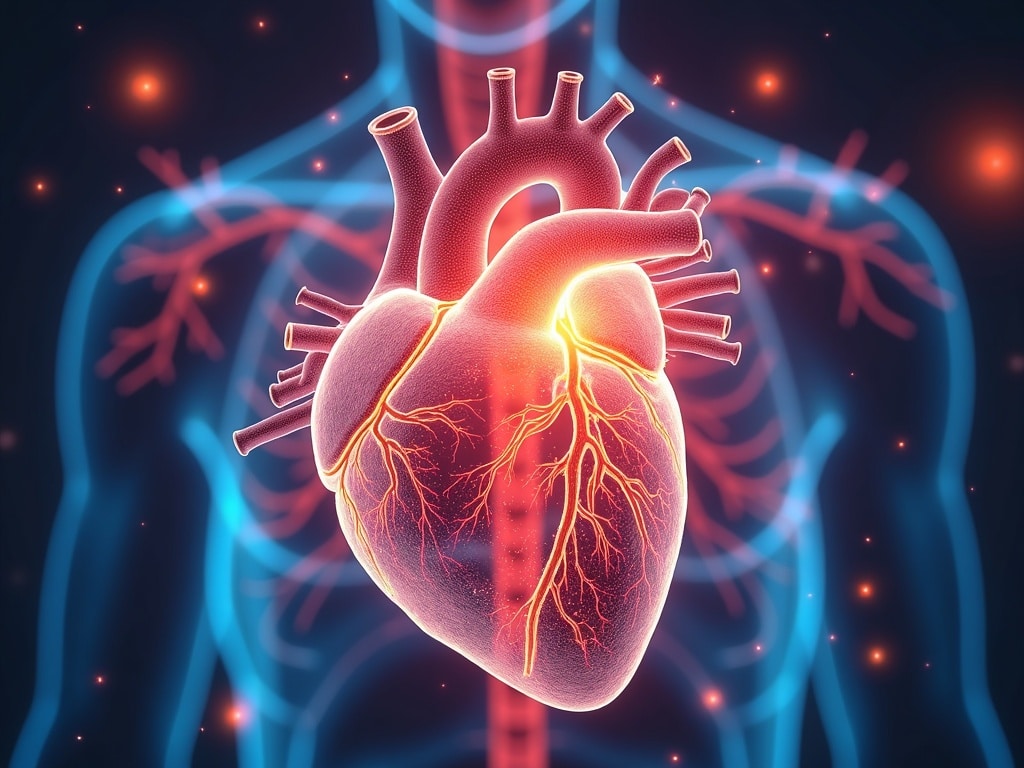How to Support Your Heart Health as You Age
Imagine your heart as a tireless engine, diligently pumping life through your veins for decades. Like any well-engineered machine, it requires regular maintenance and proactive care to keep running smoothly, especially as time marches on. While we can't stop the clock, we *cantake meaningful steps to support our heart's vitality, ensuring it remains a robust and reliable powerhouse for years to come. This isn't about restrictive diets or grueling workouts; it’s about making informed, sustainable choices that integrate seamlessly into your lifestyle.
Understanding Age-Related Changes in Heart Health
As we age, our cardiovascular system undergoes natural changes that can increase the risk of heart disease. These changes aren't a sign of inevitable decline, but rather a signal to be more attentive to our heart health. Here’s what’s happening under the hood:
- Stiffening of Arteries: Arteries lose their elasticity, becoming stiffer and less able to expand and contract. This increases blood pressure and the workload on the heart.
- Thickening of Heart Valves: The heart valves, which control blood flow, can thicken and become less flexible, potentially leading to valve dysfunction.
- Decreased Cardiac Output: The heart's ability to pump blood efficiently may decline slightly, reducing the amount of oxygen-rich blood delivered to the body.
- Increased Risk of Arrhythmias: The electrical system that controls heart rhythm can become less stable, increasing the risk of irregular heartbeats.
These changes, coupled with lifestyle factors and genetics, contribute to the increased prevalence of heart disease in older adults. However, understanding these changes empowers us to take targeted action.
Key Strategies for a Healthy Heart at Any Age
The good news is that many of the lifestyle changes that benefit your heart are also beneficial for your overall health. These strategies are effective at any age, but become particularly crucial as we get older.
Embrace a Heart-Healthy Diet
Food is medicine, and a heart-healthy diet is one of the most powerful tools we have. Forget fad diets and focus on building a sustainable, balanced eating pattern that nourishes your heart.
- Load Up on Fruits and Vegetables: Aim for at least five servings a day. The vibrant colors of fruits and vegetables indicate a wealth of vitamins, minerals, and antioxidants that protect against cellular damage. Think berries, leafy greens, bell peppers, and colorful root vegetables.
- Choose Whole Grains: Opt for whole grains like brown rice, quinoa, oats, and whole-wheat bread over refined grains like white bread and pastries. Whole grains are rich in fiber, which helps lower cholesterol and regulate blood sugar levels.
- Incorporate Healthy Fats: Not all fats are created equal. Embrace sources of healthy fats like avocados, nuts, seeds, and olive oil. These fats can help improve cholesterol levels and reduce inflammation. Limit saturated and trans fats found in processed foods, red meat, and full-fat dairy products.
- Lean Protein Sources: Include lean protein sources like fish, poultry (skinless), beans, and lentils in your diet. Fish, especially fatty fish like salmon and tuna, are rich in omega-3 fatty acids, which have been shown to reduce the risk of heart disease.
- Limit Sodium Intake: High sodium intake can contribute to high blood pressure. Be mindful of hidden sources of sodium in processed foods, canned goods, and restaurant meals. Aim for less than 2,300 milligrams of sodium per day.
Prioritize Regular Physical Activity
Exercise is not just about aesthetics; it's a cornerstone of heart health. Regular physical activity strengthens the heart muscle, improves circulation, and helps maintain a healthy weight. You don't need to run a marathon to reap the benefits; even moderate exercise can make a significant difference.
- Aim for 150 Minutes of Moderate-Intensity Exercise per Week: This could include brisk walking, cycling, swimming, or dancing. Break it down into smaller chunks of time, such as 30 minutes most days of the week.
- Incorporate Strength Training: Strength training helps build muscle mass, which can improve metabolism and overall strength. Aim for at least two strength training sessions per week, focusing on major muscle groups.
- Find Activities You Enjoy: The key to sticking with an exercise routine is to find activities you genuinely enjoy. Experiment with different activities until you find something that you look forward to.
- Consult Your Doctor: Before starting any new exercise program, especially if you have underlying health conditions, consult your doctor.
Manage Stress Effectively
Chronic stress can take a toll on your heart health, contributing to high blood pressure, inflammation, and unhealthy coping mechanisms. Finding healthy ways to manage stress is essential for protecting your heart.
- Practice Relaxation Techniques: Techniques like deep breathing, meditation, and yoga can help calm the nervous system and reduce stress levels.
- Engage in Hobbies: Make time for activities that you enjoy, whether it's reading, gardening, painting, or spending time with loved ones.
- Prioritize Sleep: Aim for 7-8 hours of quality sleep per night. Sleep deprivation can increase stress hormones and negatively impact heart health.
- Seek Social Support: Connecting with friends, family, or support groups can provide emotional support and reduce feelings of isolation.

Monitor and Manage Existing Health Conditions
Conditions like high blood pressure, high cholesterol, and diabetes can significantly increase the risk of heart disease. Managing these conditions effectively is crucial for protecting your heart as you age. This involves regular check-ups with your doctor, medication adherence, and lifestyle modifications.
- Blood Pressure Monitoring: Regularly monitor your blood pressure and work with your doctor to keep it within a healthy range (typically below 130/80 mmHg).
- Cholesterol Management: Get your cholesterol levels checked regularly and follow your doctor's recommendations for managing cholesterol, which may include lifestyle changes or medication.
- Diabetes Management: If you have diabetes, work closely with your doctor to manage your blood sugar levels through diet, exercise, and medication.
Prioritize Quality Sleep
Sleep is when your body repairs and rejuvenates itself. Inadequate sleep can disrupt hormone balance, increase inflammation, and raise blood pressure – all risk factors for heart disease. Aim for 7-8 hours of quality, uninterrupted sleep each night.
- Establish a Regular Sleep Schedule: Go to bed and wake up around the same time each day, even on weekends, to regulate your body's natural sleep-wake cycle.
- Create a Relaxing Bedtime Routine: Wind down before bed with a warm bath, reading, or listening to calming music.
- Optimize Your Sleep Environment: Make sure your bedroom is dark, quiet, and cool.
- Limit Screen Time Before Bed: The blue light emitted from electronic devices can interfere with sleep.
Stay Connected and Engaged
Social isolation and loneliness can have a detrimental impact on both mental and physical health, including heart health. Maintaining strong social connections and engaging in meaningful activities can help boost your mood, reduce stress, and promote overall well-being. Explore opportunities for social engagement in your community.
- Join Clubs or Groups: Participate in activities that interest you, such as book clubs, gardening clubs, or volunteer organizations.
- Spend Time with Loved Ones: Make an effort to connect with friends and family regularly.
- Stay Active in Your Community: Volunteer, attend local events, or take classes.
- Embrace Technology: Use technology to stay connected with loved ones who live far away.
Supplements and Heart Health: What You Need to Know
While a healthy diet should be the foundation of your heart health strategy, certain supplements may offer additional support. However, it's crucial to talk to your doctor or a registered dietitian before taking any supplements, as they can interact with medications and may not be appropriate for everyone.
- Omega-3 Fatty Acids: Found in fish oil supplements, omega-3 fatty acids have been shown to reduce triglycerides, lower blood pressure, and reduce the risk of blood clots.
- Coenzyme Q10 (CoQ10): CoQ10 is an antioxidant that plays a role in energy production. It may be beneficial for people taking statins, as statins can lower CoQ10 levels.
- Fiber Supplements: Fiber supplements like psyllium husk can help lower cholesterol levels.
Important Note: Supplements are not a substitute for a healthy diet and lifestyle. They should be used as a complement to, not a replacement for, other heart-healthy strategies.
The Importance of Regular Check-Ups
Regular check-ups with your doctor are essential for monitoring your heart health and identifying any potential problems early on. Your doctor can assess your risk factors for heart disease, perform necessary tests, and recommend appropriate interventions.
Don't wait until you experience symptoms to see your doctor. Proactive monitoring is key to preventing heart disease and maintaining a healthy heart as you age.
Listening to Your Body: Recognizing Warning Signs
While prevention is paramount, it’s also important to be aware of the warning signs of heart problems. Don’t ignore persistent or concerning symptoms; seek medical attention promptly.
- Chest Pain or Discomfort: This could feel like pressure, tightness, squeezing, or burning in the chest.
- Shortness of Breath: Difficulty breathing, especially with exertion or at rest.
- Fatigue: Unusual or excessive tiredness.
- Palpitations: A racing, fluttering, or irregular heartbeat.
- Swelling in the Ankles, Feet, or Legs: This could indicate fluid retention due to heart failure.
Remember, early detection and treatment can significantly improve outcomes for heart conditions.
Sustainable Changes for Lifelong Heart Health
Supporting your heart health as you age isn’t about quick fixes or drastic measures. It’s about making sustainable, long-term changes that integrate seamlessly into your lifestyle. By adopting a heart-healthy diet, engaging in regular physical activity, managing stress effectively, and prioritizing sleep, you can empower yourself to maintain a strong and healthy heart for years to come. Think of it not as a chore, but as an investment in your future vitality and well-being. Your heart will thank you for it.

